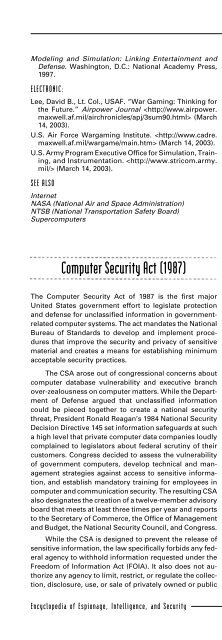ENCYCLOPEDIA OF Espionage, Intelligence, and Security Volume ...
ENCYCLOPEDIA OF Espionage, Intelligence, and Security Volume ...
ENCYCLOPEDIA OF Espionage, Intelligence, and Security Volume ...
You also want an ePaper? Increase the reach of your titles
YUMPU automatically turns print PDFs into web optimized ePapers that Google loves.
Computer Software <strong>Security</strong>Modeling <strong>and</strong> Simulation: Linking Entertainment <strong>and</strong>Defense. Washington, D.C.: National Academy Press,1997.ELECTRONIC:Lee, David B., Lt. Col., USAF. “War Gaming: Thinking forthe Future.” Airpower Journal (March14, 2003).U.S. Air Force Wargaming Institute. (March 14, 2003).U.S. Army Program Executive Office for Simulation, Training,<strong>and</strong> Instrumentation. (March 14, 2003).SEE ALSOInternetNASA (National Air <strong>and</strong> Space Administration)NTSB (National Transportation Safety Board)SupercomputersComputer <strong>Security</strong> Act (1987)The Computer <strong>Security</strong> Act of 1987 is the first majorUnited States government effort to legislate protection<strong>and</strong> defense for unclassified information in governmentrelatedcomputer systems. The act m<strong>and</strong>ates the NationalBureau of St<strong>and</strong>ards to develop <strong>and</strong> implement proceduresthat improve the security <strong>and</strong> privacy of sensitivematerial <strong>and</strong> creates a means for establishing minimumacceptable security practices.The CSA arose out of congressional concerns aboutcomputer database vulnerability <strong>and</strong> executive branchover-zealousness on computer matters. While the Departmentof Defense argued that unclassified informationcould be pieced together to create a national securitythreat, President Ronald Reagan’s 1984 National <strong>Security</strong>Decision Directive 145 set information safeguards at sucha high level that private computer data companies loudlycomplained to legislators about federal scrutiny of theircustomers. Congress decided to assess the vulnerabilityof government computers, develop technical <strong>and</strong> managementstrategies against access to sensitive information,<strong>and</strong> establish m<strong>and</strong>atory training for employees incomputer <strong>and</strong> communication security. The resulting CSAalso designates the creation of a twelve-member advisoryboard that meets at least three times per year <strong>and</strong> reportsto the Secretary of Commerce, the Office of Management<strong>and</strong> Budget, the National <strong>Security</strong> Council, <strong>and</strong> Congress.While the CSA is designed to prevent the release ofsensitive information, the law specifically forbids any federalagency to withhold information requested under theFreedom of Information Act (FOIA). It also does not authorizeany agency to limit, restrict, or regulate the collection,disclosure, use, or sale of privately owned or publicEncyclopedia of <strong>Espionage</strong>, <strong>Intelligence</strong>, <strong>and</strong> <strong>Security</strong>domain information. Despite this provision journalistshave encountered increasing difficulty obtaining FOIA accessto federal material stored in computer databases.Librarians have also observed that the Department ofDefense, Department of Energy, <strong>and</strong> NASA release fewerdocuments to the public than in the years prior to CSA.In light of the George W. Bush administration’s concernwith secrecy as an element of national security, theCSA will likely continue to be used to limit public access togovernment information.❚ FURTHER READING:BOOKS:Blyth, Andrew <strong>and</strong> Gerald L. Kovacich. Information Assurance:Surviving in the Information Environment. London:Springer, 2001.Martin, Shannon E. Bits, Bytes, <strong>and</strong> Big Brother: FederalInformation Control in the Technological Age. Westport,CT: Praeger, 1995.SEE ALSOBush Administration (2001–), United States National <strong>Security</strong>PolicyClassified InformationCommerce Department <strong>Intelligence</strong> <strong>and</strong> <strong>Security</strong> Responsibilities,United StatesComputer Fraud <strong>and</strong> Abuse Act of 1986Computer HackersComputer Hardware <strong>Security</strong>DOD (United States Department of Defense)DOE (United States Department of Energy)FOIA (Freedom of Information Act)Information <strong>Security</strong>NSC (National <strong>Security</strong> Council)Reagan Administration (1981–1989), United States National<strong>Security</strong> Policy❚ BRIAN HOYLEComputer Software <strong>Security</strong>Computer software security refers to the use of softwareto prevent damage to computer files, programs, <strong>and</strong> operatingsystems, as well as to monitor a personal computer(PC) or laptop for theft.Anti-virus software. A recommended feature for any computerthat is connected to the Internet is software thatprotects the computer from viruses. Like biological viruses,computer viruses need the machinery of another host, inthis case a computer, to make new copies of themselves<strong>and</strong> infect another host computer. There are upwards of261







![The Big Lie 9-11 and Government Complicity in Mass Murder [PDF]](https://img.yumpu.com/50957077/1/190x245/the-big-lie-9-11-and-government-complicity-in-mass-murder-pdf.jpg?quality=85)








